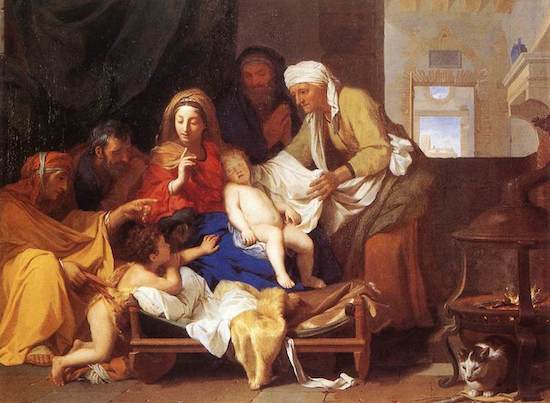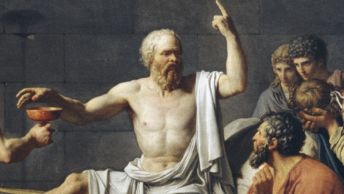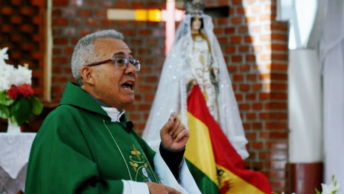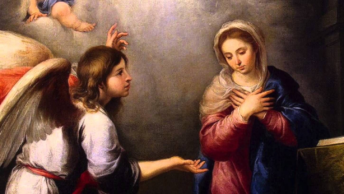
Nazareth was one of the most insignificant villages in Judah. When Jesus was first assembling His apostles we find the following exchange between two of them as reported in St. John’s gospel:
Philip found Nathaniel and told him, “We have found the one about whom Moses wrote in the law, and also the prophets, Jesus, son of Joseph, from Nazareth.” But Nathaniel said to him, “Can anything good come from Nazareth?” Philip said to him, “Come and see.” [John 1:45-45]
Christianity goes beyond doctrines, moral norms, and teachings. It goes beyond how we behave. While all of those things are important, we need to recognize that Christianity essentially involves vision… seeing things as God sees them… seeing things in God’s Light… recognizing reality and truth. Pontius Pilate during the trial of Jesus asked the central question. Truth is not something we establish, it comes from outside of us; it’s something we attain, something we come to recognize. The world thinks otherwise. “Truth?” Pilate asked, “What is truth?” Then, having disposed of truth, he had Jesus crucified.
Christmas is filled with the theme of light and darkness. We recall the Star of Bethlehem and the Magi, the Wise Men, those seers and seekers who came to honor the Source of Wisdom and Light.
Christmas is celebrated at that time of the year when darkness fills most of the day. Our Americanized commercial Christmas fills our modern day darkness with glitzy lights and glitter that all but blind us to the birth of Jesus, the Light of the World, the Light for the world that comes down to us from God in heaven.
Being a Christian involves viewing reality in a light that is different from all other sources of vision and knowledge. Christianity is all about seeing things and seeing people as Jesus sees them. It is in His Light that we can see reality as God sees it. God in Christ has come to us so that we might see… and so that we might see the meaning and purpose of the life He has given you and given me. God has given us the Light of the World so that we might see reality and see ourselves in His Light.
What, then, do we consider to be of significance to us in our world and in our own personal lives? What seems to be significant for us in our eyes may be insignificant in God’s way of seeing things. Conversely, what we think to be insignificant may be very significant in God’s eyes.
The most significant thing about Christmas is that our humanity has been invested by God with His divinity. Our ordinariness is what appeals to God. God wants to be loved by plain men and women, men and women who are fully alive. He wants to be loved and sought in the commonality of our human nature and experience. That was His purpose and plan. But because we are so far removed from His purposes it is only the extraordinary person who brings God into the regularity of his or her daily routines and patterns of behavior.
That is why the Virgin Mary is such an extraordinary person. She appeared to be, and was in reality, simply a little Jewish girl. She was lowly and considered herself to be a maidservant. But she was innocent and capable of wonder. In her simple humanity she was, in reality, of special appeal to God.
As a truly Christian celebration, Christmas is becoming more difficult for us to celebrate. Ask people what the significance of the Christ child is for them and you’ll get responses that are all lovely and nice… but completely miss the point.
Given the routine lives so many face in living, our culture has developed an entertainment industry that tells us things are not significant unless they are spectacular. Spectacles abound in sports, entertainment, and in television. But, we must ask, what do these spectacles show us?
Escapism is another way to flee from being what we consider to be just an ordinary human being. Consider the amount of alcohol, drugs, and pornography that fills our culture. We are continually told that it is a dreaded thing to be simply and plainly human.
Yet the message of Christmas is, in its radical form, a message that tells us God wants to be loved by us in our littleness and in our vulnerability. He even allowed His only-begotten Son to hang in that condition on His Cross. He did this in order to show us the glory of our humanity. Human eyes that see with no vision of reality view Christ on the Cross as twisted and deformed; stripped naked of all significance. Even in our day we all stand in amazement when we meet people who are sincere, speak only the truth, and have such a wholesome awareness of themselves that we view them in wonderment.
God’s Christmas gift to us is the fact that we can carry the insights of Christmas into our fields of employment, our careers, our marriages, and into our relationships with the world and all others in the world that surround us.
The Incarnation makes significant those things which appear to be insignificant. A simple Jewish maiden, a little town called Bethlehem, and ordinary humanity – all become apt conductors of the divine. It all happens in the inversion of values that Christmas brings to us. New Light comes into our world, a Light that prompts the skeptical Pontius Pilates of our own day to ask: “Truth? What is truth?”
How, then, do we see the reality of our selves and of our lives? What do we consider to be significant and meaningful? And how do we see ourselves in the eyes of God? Dare we even look? Christmas says: “Yes!” We can look. Christmas can give us faith in our selves… it can give us hope… and it can give us love. Christmas gives us the power to see our world as God sees it to see what in God’s light we can be.
Bethlehem, Mary, Joseph and Jesus… they all belong to us because we can identify ourselves in them. May all of that allow us to be at peace with ourselves… and between ourselves… and with God.
“I would have plain men and women love me,” God says, “not just saints.” And so may we love Him in the everyday and seemingly insignificant things we do. And may we accept ourselves and others for what we are… for what we are both now and in eternity. For the Kingdom of Heaven is not some pie-in-the-sky fantasyland that is divorced from our lives and the reality in which we live. It is, as Jesus said, here among us.
With the right insights we are not very far from it. Come and see. And may the peace and joy of Christmas be with you.








